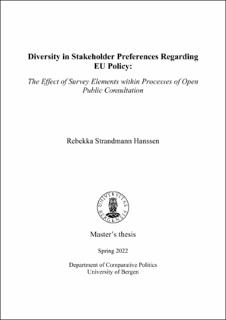| dc.contributor.author | Hanssen, Rebekka Strandmann | |
| dc.date.accessioned | 2022-08-24T09:09:14Z | |
| dc.date.issued | 2022-06-22 | |
| dc.date.submitted | 2022-08-22T22:00:24Z | |
| dc.identifier.uri | https://hdl.handle.net/11250/3013211 | |
| dc.description.abstract | Since the "European Governance A White Paper" launched in 2001, the European Union has worked to improve accountability and transparency within the organization. Preferences voiced by the public are one of the most important means of ensuring democratic policy formulations. Previous research on participation and voicing preferences through different means for influencing EU policies has indicated different expectations for what affects and motivates diversity in voiced preferences. In the policy formulation stage, open consultation venues are often used to receive intel and inputs from diverse sets of stakeholder groups. Additionally, open public consultations have been found to attract broad stakeholder representation, indicating higher possibilities for observing diversity in stated preferences. This thesis analyzes how diverse received inputs are within open public consultation surveys and tests how different survey elements affect the observed diversity. Clustering methods have been applied to analyze how diverse stated preferences are. By mapping groups of similar preferences, the result shows that most surveys receive from 2 to 7 observed preference groups, clearly indicating diversity. This aligned with previous findings of more diverse stakeholder participation through open consultation venues. For testing effects on the observed diversity in preferences, issue salience, mentioning targeted stakeholders, complexity within the survey, and complexity within policy issues have been collected and applicated through negative binomial regression and multiple linear regression. The number of observed preference groupings decreases when targeted stakeholders are mentioned in the open public survey. Simultaneously, issue salience increases observed preference groups and the size of respondents observed within the preference groups. Neither issue complexity nor survey complexity affects diversity in stated preferences.The stated effects of issue salience and mention of targeted stakeholders indicate support for previous research, which has found different stakeholders types to voice diverse preferences. | |
| dc.language.iso | eng | |
| dc.publisher | The University of Bergen | |
| dc.rights | Copyright the Author. All rights reserved | |
| dc.subject | Multiple linear regression | |
| dc.subject | OPC survey | |
| dc.subject | Clustering | |
| dc.subject | Stakeholder preferences | |
| dc.subject | Machine learning | |
| dc.subject | Negative binomial regression | |
| dc.subject | EU | |
| dc.title | Diversity in Stakeholder Preferences Regarding EU Policy: The Effect of Survey Elements within Processes of Open Public Consultation | |
| dc.type | Master thesis | |
| dc.date.updated | 2022-08-22T22:00:24Z | |
| dc.rights.holder | Copyright the Author. All rights reserved | |
| dc.description.degree | Masteroppgave | |
| dc.description.localcode | SAMPOL350 | |
| dc.description.localcode | MASV-SAPO | |
| dc.subject.nus | 731114 | |
| fs.subjectcode | SAMPOL350 | |
| fs.unitcode | 15-13-0 | |
| dc.date.embargoenddate | 2023-06-22 | |
